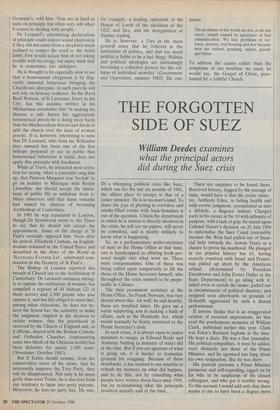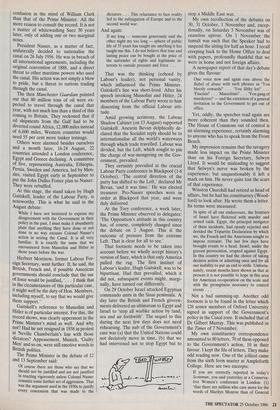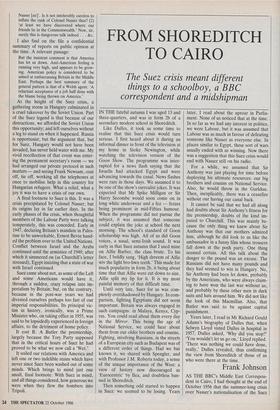THE FORGOTTEN SIDE OF SUEZ
William Deedes examines
what the principal actors did during the Suez crisis
IN a whopping political crisis like Suez, which ran for the last six months of 1956, the silliest place to occupy is that of a junior minister. He is in no-man's-land. To share the joys of plotting in corridors and smoke-filled rooms with back-benchers is out of the question. Unless the department in which he is minion is directly involved in the crisis, he will see no papers, will never be consulted, and is mostly unlikely to know what is happening.
So, as a parliamentary under-secretary of state in the Home Office at that time, one is handicapped in offering fresh per- sonal insight into what went on. There were compensations. One of these was being called upon temporarily to fill the shoes of the Home Secretary himself, who throughout the crisis seemed to be perpe- tually in Cabinet.
The then permanent secretary at the Home Office, Sir Frank Newsam, was very decent about this. Ah well, he said heavily, these are troubled times. He gave me a warm supporting arm in making a hash of affairs, such as the Homicide Act, which would normally be firmly restricted to the Home Secretary's desk.
In such crises, it is always open to junior ministers to resign, as Edward Boyle and Anthony Nutting (a minister of state) did at the time. But if you are ignorant of what is going on, it is harder to formulate grounds for resigning. Because of these drawbacks, it has seemed to me sensible to refresh my memory on what did happen, and to do this, not by consulting what people have written about Suez since 1956, but by re-examining what the principals involved actually said at the time. There are surprises to be found there. Received history, fogged by the passage of time, would have it that the prime minis- ter, Anthony Eden, in failing health and with erratic judgment, precipitated us into a debacle, a disgrace indeed. Charged early in his career at No 10 with infirmity of purpose, with a lack of grip, he seized upon Colonel Nasser's decision on 26 July 1956 to nationalise the Suez Canal (ostensibly because the West had pulled out of finan- cial help towards the Aswan Dam) as a chance to prove his manhood. He plunged in (so popular history has it), having secretly connived with Israel and France; was pulled up short by the American refusal (determined by President Eisenhower and John Foster Dulles at the State Department) to go along with it; failed even to scotch the snake; pulled out in circumstances of political disarray; and resigned soon afterwards on grounds of ill-health aggravated by such a dismal performance.
If anyone thinks that is an exaggerated version of received impressions, let him read the posthumous memoirs of William Clark, published earlier this year. Clark was Eden's Bernard Ingham at the time. He kept a diary. He was a fine journalist. His political sympathies, it must be added, were distinctly not those of the Prime Minister, and he agonised too long about his own resignation. But he was there.
His portrait presents a Prime Minister paranoiac and self-regarding, egged on by his wife to be suspicious of his closest colleagues, and who got it terribly wrong. To this account I would add only that there seems to me to have been a degree more confusion in the mind of William Clark than that of the Prime Minister. All the more reason to consult the record. It is not a matter of whitewashing Suez 30 years later, only of adding one or two marginal notes.
President Nasser, as a matter of fact, unilaterally decided to nationalise the canal on 26 July 1956. He was in breach of all international agreements, including the original convention of 1888, and a direct threat to other maritime powers who used the canal. His action was not simply a blow to pride, but a threat to nations trading through the canal.
The then Manchester Guardian pointed out that 80 million tons of oil were ex- pected to travel through the canal that year, with not much less than a third of this coming to Britain. They reckoned that if oil shipments from the Gulf had to be diverted round Africa, 12,000 miles instead of 6,600 miles, Western countries would need 55 per cent more tanker tonnage.
Others were alarmed besides ourselves and a month later, 16-24 August, 22 countries attended a London conference, Egypt and Greece declining. A committee of five, representing Australia, Ethiopia, Persia, Sweden and America, led by Men- zies, visited Egypt early in September to put the John Dulles Foster plan to Nasser. They were rebuffed.
At this stage, the stand taken by Hugh Gaitskell, leader of the Labour Party, is noteworthy. This is what he said in the August debate:
While I have not hesitated to express my disagreement with the Government in their policy in the past, I must make it abundantly plain that anything they have done or not done in no way excuses Colonel Nasser's action in seizing the Canal. It is all very familiar. It is exactly the same that we encountered from Mussolini and Hitler in those years before the war.
Herbert Morrison, former Labour For- eign Secretary, went further. If, he said, the British, French and, if possible American governments should conclude that the use of force would be justified,'. . . I think that in the circumstances of this particular case, it might well be the duty of Hon. Members, including myself, to say that we would give them support.'
Gaitskell's reference to Mussolini and Hitler is of particular interest. For this, the record shows, was clearly uppermost in the Prime Minister's mind as well. And why not? Had he not resigned in 1938 in protest at Neville Chamberlain's line with those dictators? Appeasement, Munich, 'Guilty Men' and so on, were still emotive words in British politics.
The Prime Minister in the debate of 12 and 13 September said:
Of course there are those who say that we should not be justified and are not justified in reacting vigorously unless Colonel Nasser commits some further act of aggression. That was the argument used in the 1930s to justify every concession that was made to the dictators . . . This reluctance to face reality led to the subjugation of Europe and to the second world war.
And again:
If my long — someone generously said the other night my too long — sphere of public life of 35 years has taught me anything it has taught me this. I do not believe that true and lasting peace can be bought at the price of the surrender of rights and legitimate in- terests to outside pressure and force . . .
That was the thinking (echoed by Labour's leader), not personal vanity, which influenced the Prime Minister. Gaitskell's line was short-lived. After his speech invoking Mussolini and Hitler, 24 members of the Labour Party wrote to him dissenting from the official Labour atti- tude.
Amid growing acrimony, the Labour Shadow Cabinet (on 13 August) supported Gaitskell. Aneurin Bevan delphically de- clared that the Socialist reply should be to internationalise all the world's waterways through which trade travelled. Labour was divided, but the Left, which sought to pin the charge of war-mongering on the Gov- ernment, prevailed.
They certainly prevailed at the crucial Labour Party conference in Blackpool (1-6 October). 'The central direction of the party has shifted to the Left,' declared Mr Bevan, 'and it was time.' He was elected treasurer. Pro-Nasser speeches were in order at Blackpool that year, and were duly delivered.
At the Tory conference, a week later, the Prime Minister observed to delegates: 'The Opposition's attitude in this country has, of course, completely changed since the debate on 2 August. This is the outcome of pressure from the extreme Left. That is clear for all to see.'
That footnote needs to be taken into account before we wholly accept history's version of Suez, which is that only America pulled the rug. The first instinct of Labour's leader, Hugh Gaitskell, was to be bipartisan. Had that prevailed, which it did not, subsequent events might, margi- nally, have turned out differently. On 29 October Israel attacked Egyptian commando units in the Sinai peninsula. A day later the British and French govern- ments delivered an ultimatum to Egypt and Israel to 'stop all warlike action by land, sea and air forthwith'. The sequel to this during the next few days does not need rehearsing. The nub of the Government's case was (a) that the United Nations could not decisively move in time, (b) that we had intervened not to stop Egypt but to stop a Middle East war.
My own recollection of the debates on 30, 31 October, 1 November and, excep- tionally, on Saturday 3 November was of ceaseless uproar. On 1 November the tumult was such that the Speaker had to suspend the sitting for half an hour. I recall creeping back to the Home Office to deal with papers, profoundly thankful that we were in home and not foreign affairs.
A newspaper report of that day's debate gives the flavour:
One voice now and again rose above the Babel of abuse with such phrases as 'You bloody cowards!' . . . 'You filthy lot!' . . . 'Fascists!'. . . `Mussolinis!' . . . 'You gang of murderers!' — and the extension of a general invitation to the Government to get out of office.
Yet, oddly, the speeches read again are more coherent than they sounded then. The House of Commons out of control is an alarming experience, certainly alarming to anyone who has to speak from the Front Bench.
My impression remains that the savagery made less impact on the Prime Minister than on his Foreign Secretary, Selwyn Lloyd. It would be misleading to suggest that Selwyn's nerve was broken by the experience; but unquestionably it left a mark on him. He never quite lost the scars of that experience.
Winston Churchill had retired as head of affairs, but he had his constituency (Wood- ford) to look after. He wrote them a letter. Its terms were measured:
In spite of all our endeavours, the frontiers of Israel have flickered with murder and armed raids. Egypt, the principal instigator of these incidents, had openly rejected and derided the Tripartite Declaration by which we, the French and the Americans sought to impose restraint. The last few days have brought events to a head. Israel, under the gravest provocation, erupted against Egypt. In this country we had the choice of taking decisive action or admitting once and for all our inability to put an end to strife. Unfortu- nately, recent months have shown us that at present it is not possible to hope in this area for American co-operation on the scale and with the promptness necessary to control events .
Not a bad summing-up. Another odd footnote is to be found in the letter which 126 senior members of Oxford University signed in support of the Government's policy in the Canal zone. It included that of Dr Gilbert Murray. This was published in the Times of 7 November.
My own constituency correspondence amounted to 80 letters, 70 of them opposed to the Government's action, 10 in their favour. I kept the file of letters. They make odd reading now. One of the jolliest came from the sixth form master at Ampleforth College. Here are two excerpts: If you are correctly reported in today's Scotsman, you said yesterday at a Conserva- tive Women's conference in London: (1) 'that there are million who care more for the words of Marilyn Monroe than of General Nasser [sic]'. Is it not intolerably careless to inflate the rank of Colonel Nasser thus? (2) 'at least we have discovered where our friends lie in the Commonwealth.' Now, sir, surely this is dangerous talk indeed . . . &c.
I also find on the file a confidential summary of reports on public opinion at the time. A relevant passage:
But the insistent comment is that America has let us down. Anti-American feeling is running very high, and appears to be grow- ing. American policy is considered to be aimed at embarrassing Britain in the Middle East. Perhaps the best summary of the general pattern is that of a Welsh agent: 'A reluctant acceptance of a job half done with the blame being thrown on America.'
At the height of the Suez crisis, a gathering storm in Hungary culminated in a cruel takeover by the Soviet Union. Part of the Suez legend is that because of our distractions, we afforded the Soviet Union this opportunity; and left ourselves without a leg to stand on when it happened. Russia is opportunist; but the argument that, but for Suez, Hungary would not have been invaded, has never held water with me. My vivid recollection of that event was enter- ing the permanent secretary's room — we had arranged our private protocol in such matters — and seeing Frank Newsam, coat off, tie off, working all the telephones at once to mobilise help in this country for Hungarian refugees. What a relief, what a joy it was to have a crisis of our own.
A final footnote to Suez is this. It was a crisis precipitated by Colonel Nasser; but its origins lay in far earlier days. In the early phases of the crisis, when thoughtful members of the Labour Party were talking temperately, this was conceded. Early in 1947, declaring Britain's mandate in Pales- tine to be unworkable, Ernest Bevin hand- ed the problem over to the United Nations.
Conflict between Israel and the Arabs continued until the armistice of 1949; after which it simmered on (as Churchill's letter stressed), Egypt insisting that a state of war with Israel continued.
Suez came about not, as some of the Left and some Americans would have it, through a sudden, crazy relapse into im- perialism by Britain; but, on the contrary, because in the post-war years we had divested ourselves perhaps too fast of our imperial responsibilities. Its principal vic- tim in history, ironically, was a Prime Minister who, on taking office in 1955, was said to be lopsidedly experienced in foreign affairs, to the detriment of home policy.
It cost R. A Butler the premiership, largely because the Tory Party supposed that in the critical hours of Suez he had proved to be what we now call a 'Wet.'
It soiled our relations with America and left one or two indelible stains which have never since Suez been washed out of some minds. Which brings to mind just one small, final footnote. With Suez in mind, and all things considered, how generous we were when they flew the bombers into Tripoli.




























































 Previous page
Previous page